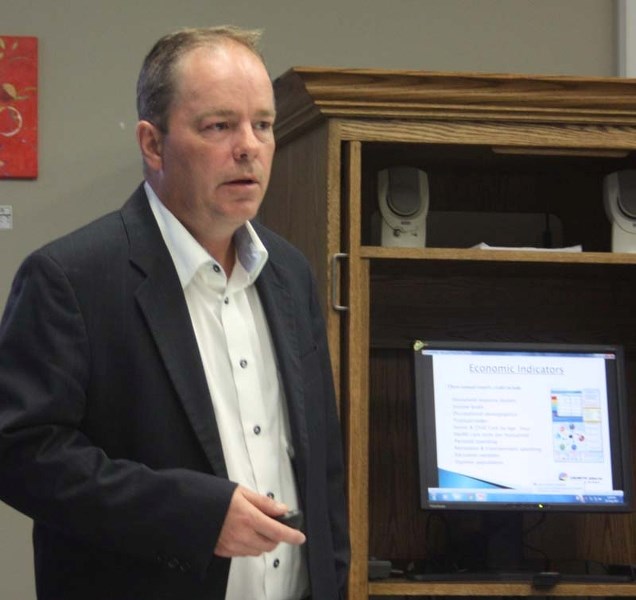Alberta’s Agriculture Financial Services Corporation (AFSC) crop insurance system needs to be fixed.
That is the conclusion Woodlands County Council came to after a discussion about the provincial program during their regular meeting in Fort Assiniboine on Tuesday, Aug. 18.
Originally the item wasn’t on the meeting’s agenda, but council decided it needed to be addressed because of the large number of farmers in Woodlands County who have been affected by this spring and summer’s drought conditions.
The AFSC is an Alberta crown corporation, which reports to the Minister of Alberta Agriculture and Rural Development, whose purpose is to provide a wide variety of financial services to farmers, including loans, income stability and disaster assistance. AFSC also provides farmers with an assortment of insurance programs.
According to current crop data, Alberta Agriculture estimates around 80 per cent of Alberta farmers will experience some degree of impact due to the dry weather.
Fort Assiniboine Coun. Dale Kluin said he, like many people, were hopeful that the AFSC insurance program would do a lot to mitigate the issues farmers were facing due to drought.
“Before the NDP toured the province, all we heard on the radio and TV was him (Oneil Carlier, agriculture minister) saying that the insurance program was going to save everybody,” he said, adding that after he looked into the issue he knew that wasn’t going to be the case. “Using his numbers, only five per cent of the producers have hay and forage insurance.”
Kluin said it is obvious that the AFSC insurance program isn’t working for a lot of farmers, or otherwise they would’ve purchased the insurance.
He also questioned whether those who purchased the insurance will receive any benefits.
“There are producers around here that have applied and figured they would be getting insurance aren’t going to get one frickin’ nickel,” Kluin said, adding that before next year the government has to address the AFSC insurance program. “Otherwise we will be in the same boat again next year.”
Kluin suggested that council or the Agriculture Services Board draft a letter telling the agriculture minister how concerned they are about the state of the AFSC’s insurance programs and that they need to be overhauled.
Dale McQueen, Coun. for Goose Lake, said that any correspondence to the minister should be written or endorsed by both council and Agriculture Services Board, adding that way the letter will have ‘some extra clout’.
Blue Ridge Coun. Dan Pritchard wondered if a letter would have any impact on the minister.
“What are we going to tell him that he doesn’t already know?” he asked.
Both McQueen and Kluin said by having something in writing it would emphasize how serious the issue is.
McQueen believes one of the biggest issues farmers have with the program is thresholds.
“I know in my situation, I’m at least 10,000 pounds over what I have produced so far this year and I have one field that has been 100 per cent rejected,” he said. “For what we are paying for premiums and what we are seeing as payouts, I’m not sure it is worth it. Basically you have to be wiped out before seeing any type of a payout.”
McQueen suggested any changes that the AFSC makes should be modeled after the program’s hail insurance coverage.
“I have told them (AFSC) that what you get for hail damage has been more than adequate any time that I have used it,” he said, adding that farmers would pay the premiums as long as they knew there would be a safety net when they needed it.
Whitecourt West Coun. Chad Merrifield said as a grain farmer he has never dealt with the AFSC’s insurance program directly.
He said with his grain insurance policy, he has the option to choose anywhere from 50 to 80 per cent coverage.
“I know when I was taking 60 per cent coverage, I never had a wreck bad enough to be able to collect,” Merrifield said. “If you move up to 80 per cent coverage you have a much better chance of the insurance triggering.” McQueen said another issue he has heard about the program from hay producers is that even when they do have insurance it is based on a crop price considerably lower than market price.
“If you get a year like this when you are being covered for three cents and the asking price is 10 to 12, even if you get 100 per cent coverage, you are still being shortchanged,” he said.
Council unanimously approved a motion made by McQueen for council to draft a letter that would be endorsed by the Agricultural Services Board to the Minister of Agriculture.



